
Trash bags are one of those everyday items we rarely think about—until we start wondering what they’re made of and where they end up. Are trash bags releasing harmful chemicals into your home or the planet? And if you’re trying to live a more eco-conscious life, is there a better alternative?
In this guide, we answer two essential questions:
👉 Are trash bags toxic?
👉 Are trash bags compostable?
Let’s help you make smarter, greener choices for your home and health.
🔗 Want to learn how plastics affect your health? Read this American Lung Association article on plastic waste.
🚫 Are Trash Bags Toxic?
Most trash bags are made from polyethylene—a plastic that’s chemically stable and generally considered safe for everyday use. But not all bags are created equal.
⚠️ What Makes Some Trash Bags Potentially Toxic?
- Artificial fragrances – Can cause allergic reactions and worsen asthma.
- Color dyes and plasticizers – May contain phthalates or other leaching chemicals.
- PVC (polyvinyl chloride) – Less common, but may contain harmful chlorine-based compounds.
✅ Best practice: Choose BPA-free, unscented polyethylene bags—or better yet, switch to compostable bags for both health and environmental safety.
🧴 Do Scented Trash Bags Have Health Risks?
Yes, especially for sensitive individuals. Scented bags often contain volatile organic compounds (VOCs). These airborne chemicals can:
- Aggravate respiratory conditions
- Trigger headaches or nausea
- Impact indoor air quality
If you’re using trash bags in kitchens, baby nurseries, or pet areas, it’s safer to go unscented and non-toxic.
🌱 Are Trash Bags Compostable?
Yes—but only certain ones. Compostable trash bags are specially designed to break down quickly in a composting environment.
✅ What Makes a Trash Bag Truly Compostable?
- Made from plant-based materials like PLA (polylactic acid) or PBAT.
- Certified by BPI or meets ASTM D6400 standards.
- Breaks down into non-toxic, organic matter in 90–180 days (under the right conditions).
📘 Learn more about the difference in EcoSafe’s guide to compostable trash bags.

♻️ Compostable vs Biodegradable Trash Bags
Don’t be fooled by labels—biodegradable and compostable are not the same thing.
| Feature | Compostable | Biodegradable |
| Breakdown Time | 90–180 days | Months to years |
| Leaves Microplastics? | No | Sometimes |
| Needs Certification? | Yes (BPI, ASTM D6400) | Often no regulation |
| Breakdown Environment | Composting facility or pile | Landfill or open air |
📝 Reminder: Compostable bags need moisture, heat, and oxygen—conditions not available in landfills.
🌿 Why Compostable Trash Bags Are Better
Switching to compostable trash bags helps reduce:
- Plastic pollution
- Greenhouse gas emissions
- Microplastics in soil and water
🌍 At PRN Plus, we encourage using certified compostable bags for kitchen waste, yard clippings, and other organic materials.
🛍️ Are Compostable Trash Bags Easy to Use?
Absolutely! Many compostable bags now match plastic in:
- Strength
- Durability
- Odor control
You can use them in:
- Countertop compost bins
- Curbside green waste programs
- Bathroom or light-duty bins
And they don’t release harmful chemicals—perfect for eco-conscious homes.

🔍 What Trash Bag Certifications Should You Look For?
To avoid greenwashing, make sure your trash bags are certified:
- BPI Certified – Ensures compostability under commercial conditions
- TÜV Austria (OK Compost) – Validates breakdown in industrial or home composting
- USDA BioPreferred Label – Indicates plant-based materials
- ASTM D6400 – Recognized compostable standard in the U.S.
Buying certified compostable bags ensures they’ll break down as promised—without leaving toxic residue.
✅ Final Takeaways
✔️ Are trash bags toxic?
Only if they contain added chemicals like fragrances or dyes. Stick to unscented, BPA-free, or compostable options.
✔️ Are trash bags compostable?
Yes—if certified. Look for BPI, ASTM D6400, or plant-based materials.
📘 Want more in-depth info? Read Ethical Consumer’s guide to compostable bags.
Purchase Trash Bags
🧠 Expert Tip: Match Bags with Bin Type
- Use smaller 3–6 gallon compostable bags for countertop compost bins.
- Choose 13-gallon options for kitchen and household bins.
- For yard waste, look for 33-gallon or larger compostable liners.
🚀 Want to Ditch Toxic Trash Bags?
At PRN Plus, we believe that small, mindful choices can lead to big change. Switching to compostable trash bags is one easy way to reduce your carbon footprint and protect your family’s health.
Trash bags can be toxic if they contain added chemicals like fragrances or dyes. It is recommended to opt for unscented, BPA-free, or compostable options for a safer choice. Compostable trash bags are available, but ensure they are certified by looking for BPI, ASTM D6400, or plant-based materials. For more detailed information, refer to Ethical Consumer’s compostable bags guide.
Buy Garbage Bags PRN PLUS





